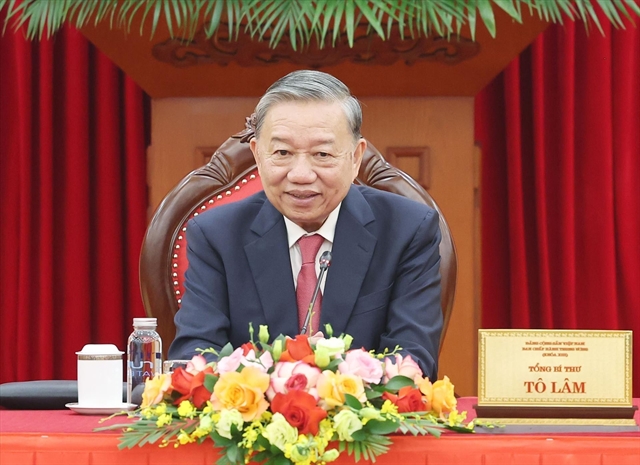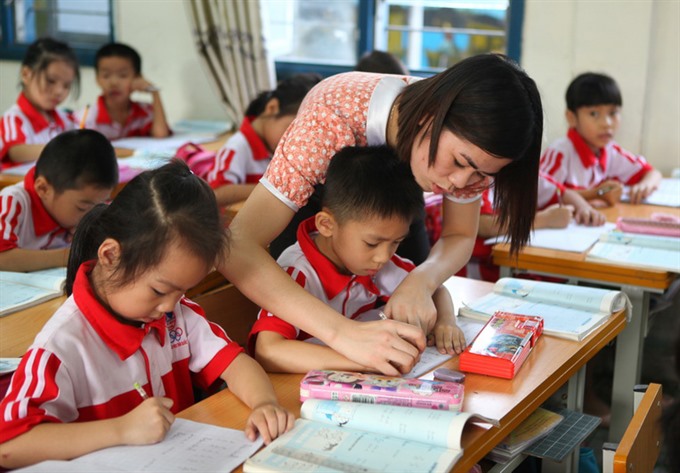 Politics & Law
Politics & Law

Textbook reform aiming to switch from one single textbook set to different sets of textbooks for each subject caused heated debate at the National Assembly (NA) meeting yesterday.
 |
| A teacher at Trần Quốc Toản Elementary School in the coastal province of Quảng Ninh teaches her pupils how to write. The benefits and drawbacks of using one or many sets of textbooks were discussed at the National Assembly’s meeting yesterday. — VNA/VNS Photo Quý Trung |
HÀ NỘI — Textbook reform aiming to switch from one single textbook set to different sets of textbooks for each subject caused heated debate at the National Assembly (NA) meeting yesterday.
Spending half of the day weighing in on the amended draft Law on Education, NA deputies heard the benefits and drawbacks of using one or many sets of textbooks.
Deputy Cao Đình Thưởng from Phú Thọ Province raised his concern about theory-packed academic textbook content, which is overloading students.
“The knowledge needs to be presented in a simple and easy-to-understand way, and it should combine national traditions with international integration features,” Thưởng said, adding that he favours using one set of textbooks nationwide. The others would be reference books.
On the other side, deputy Nguyễn Thị Phúc from Bình Thuận Province is content with different sets of textbooks for each subject and advocated letting schools select a suitable one.
Sharing the same opinion, deputy Nguyễn Ngọc Bảo from Bắc Ninh Province agreed on calling for private sector investment in printing and circulating textbooks. The Ministry of Education and Training should lead the way in composing the books.
“Textbooks for primary and secondary schools should be designed with basic knowledge only while those for high school students must include updated socio-economic knowledge,” he said. “Teachers need to give out specific examples to update students on that knowledge.”
Commenting on the proposal to collect feedback from parents and students before making a decision on textbook selection, deputy Hứa Thị Hà from Tuyên Quang Province doubted whether parents and students were knowledgeable enough to assess the textbooks, proposing schools collect feedback from teachers only.
Teacher qualifications
Discussing pedagogy students’ unemployment after graduation, Phan Thanh Bình, Chairman of the NA Committee for Culture, Education, Youth and Children, said criteria on teacher recruitment must be tightened.
According to the amended draft law, secondary and high school teachers must hold a pedagogy bachelor’s degree or have a pedagogy certificate.
Bình argued that those who obtain a degree in a different major and then attend a pedagogy training course to get a certificate should not be qualified to become teachers.
Opinions differed on the proposal of lifting preschool teacher qualification standards from intermediate school graduation to a college education.
It is estimated that over 107,000 preschool teachers need training to be qualified for the new standard if the draft law is adopted.
Supporters said improving capacity of preschool teachers is necessary to improve the quality of preschool education, which plays a foundational role in human development.
Opponents proposed keeping the intermediate graduation standard and allocating a budget for preschool facility investments.
Regarding the free tuition policy for preschool children and students of public primary and secondary schools, the deputies agreed it must be conducted step by step according to the schedule, first prioritising remote and disadvantaged areas.
Deputy Phan Thanh Bình said that private sector investments are needed to supplement State investment in education.
The Government should ensure the allocation of 20 per cent of its annual State budget on educational development, he said.
State secrets
Later the same day, with 91.55 per cent approval, the NA adopted the Law on the Protection of State Secrets, which comprises five chapters with 28 articles.
The law, which will come into force in 2020, regulates the principles, scope, provision and transfer of State secret protection, prohibited actions, and international co-operation in protecting State secrets.
Among the State secrets protected by the law are political details including internal and external policies of the Party and State, security-defence secrets, the Constitution and law legislation, judiciary activities and diplomatic strategies.
Questions and answers for national inspections on anti-corruption activities are also on the list.
The Prime Minister is responsible for approving the State secrets list.
Ministers and leaders of ministerial-level agencies are in charge of compiling the list of State secrets in the sectors they manage. The Ministry of Public Security and Ministry of Defence are in charge of assessing the lists. — VNS